
Electronic stability control (ESC), also referred to as electronic stability program (ESP) or dynamic stability control (DSC), is a computerized technology that improves a vehicle's stability by detecting and reducing loss of traction (skidding). When ESC detects loss of steering control, it automatically applies the brakes to help steer the vehicle where the driver intends to go. Braking is automatically applied to wheels individually, such as the outer front wheel to counter oversteer, or the inner rear wheel to counter understeer. Some ESC systems also reduce engine power until control is regained. ESC does not improve a vehicle's cornering performance; instead, it helps reduce the chance of the driver losing control of the vehicle.

The Detroit Auto Show, formerly known as the North American International Auto Show (NAIAS), is an annual auto show held in Detroit, Michigan. Hosted at Huntington Place since 1965, it is among the largest auto shows in North America, and is widely regarded as one of the automotive industry's most important events.

A four-wheel drive, also called 4×4 or 4WD, is a two-axled vehicle drivetrain capable of providing torque to all of its wheels simultaneously. It may be full-time or on-demand, and is typically linked via a transfer case providing an additional output drive shaft and, in many instances, additional gear ranges.

The Chicago Auto Show is held annually in February at Chicago's McCormick Place convention center. It is the largest auto show in North America.

The New York International Auto Show is an annual auto show that is held in Manhattan, New York City in late March or early April. It is held at the Jacob Javits Convention Center. It usually opens on or just before Easter weekend and closes on the first Sunday after Easter.

The Geneva International Motor Show was an annual auto show held in March in the Swiss city of Geneva.
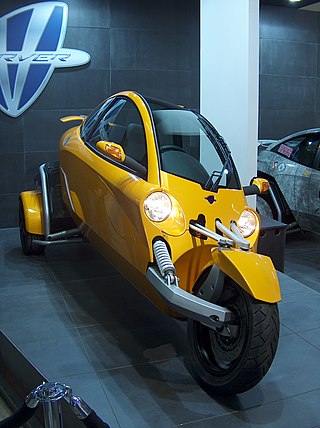
A tilting three-wheeler, tilting trike, leaning trike, or even just tilter, is a three-wheeled vehicle and usually a narrow-track vehicle whose body and or wheels tilt in the direction of a turn. Such vehicles can corner without rolling over despite having a narrow axle track because they can balance some or all of the roll moment caused by centripetal acceleration with an opposite roll moment caused by gravity, as bicycles and motorcycles do. This also reduces the lateral acceleration experienced by the rider, which some find more comfortable than the alternative. The narrow profile can result in reduced aerodynamic drag and increased fuel efficiency. These types of vehicles have also been described as "man-wide vehicles" (MWV).

The International Motor Show Germany or International Mobility Show Germany, in German known as the Internationale Automobil-Ausstellung, is one of the world's largest mobility trade fairs. It consists of two separate fairs, that subdivided in 1991. While the IAA Mobility displays passenger vehicles, motorcycles and bikes, the IAA Transportation specializes in commercial vehicles. Before the separation, the show was held solely at the Messe Frankfurt.
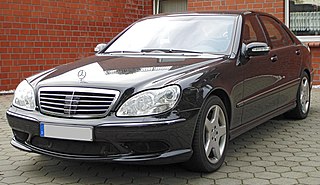
Active Body Control, or ABC, is the Mercedes-Benz brand name used to describe electronically controlled hydropneumatic suspension.
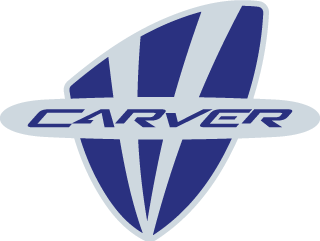
Carver Europe B.V. was a Dutch company that developed and manufactured three-wheeled electric enclosed man-wide vehicles. The company's core technology was the Dynamic Vehicle Control (DVC) system, which enables narrow vehicles to make banked turns, aiding stability when turning at high speeds.
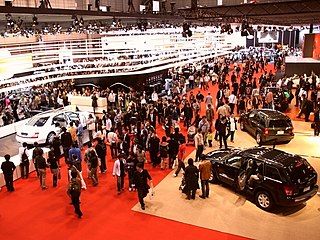
The Japan Mobility Show (ジャパンモビリティショー), called Tokyo Motor Show (東京モーターショー) (TMS) until 2019, is a biennial auto show held in October–November at the Tokyo Big Sight, Tokyo, Japan for cars, motorcycles and commercial vehicles. Hosted by the Japan Automobile Manufacturers Association (JAMA), it is a recognized international show by the Organisation Internationale des Constructeurs d'Automobiles, and normally sees more concept cars than actual production car introductions, which is the reason why the automotive press sees the show as one of the motorshow's big five.

The Los Angeles Auto Show, also known as the LA Auto Show, is an auto show held annually at the Los Angeles Convention Center in Los Angeles, California, United States. It is open to the public for ten days, filling 760,000 square feet (71,000 m2) of exhibit space. Since 2006 the event is held in November or December.
Hybrid vehicle drivetrains transmit power to the driving wheels for hybrid vehicles. A hybrid vehicle has multiple forms of motive power, and can come in many configurations. For example, a hybrid may receive its energy by burning gasoline, but switch between an electric motor and a combustion engine.
An active suspension is a type of automotive suspension that uses an onboard control system to control the vertical movement of the vehicle's wheels and axles relative to the chassis or vehicle frame, rather than the conventional passive suspension that relies solely on large springs to maintain static support and dampen the vertical wheel movements caused by the road surface. Active suspensions are divided into two classes: true active suspensions, and adaptive or semi-active suspensions. While adaptive suspensions only vary shock absorber firmness to match changing road or dynamic conditions, active suspensions use some type of actuator to raise and lower the chassis independently at each wheel.
A retro-style automobile is a vehicle that is styled to appear like cars from previous decades. Often these cars use modern technology and production techniques. This design trend developed in the early 1990s and led to almost all automobile brands introducing models that referenced previous cars of the 1950s and 1960s.
The European Motor Show Brussels is an auto show held biennial in the city of Brussels, Belgium. The number of visitors is around 270,000. The show is organized by FEBIAC and is scheduled by the Organisation Internationale des Constructeurs d'Automobiles.

The Mercedes-Benz S-Class Coupé and Convertible (C217/A217) are grand tourers manufactured by Mercedes-Benz from 2014 to 2020.

The Nissan Land Glider is an electric concept car presented by the Japanese car manufacturer Nissan at the 2009 Tokyo Motor Show.
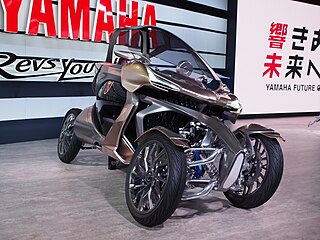
A narrow-track vehicle is a vehicle that leaves a narrow ground track as it moves forward. Narrow-track vehicles may have lateral stability when stationary but usually lean into turns to prevent falling towards the outside.
















